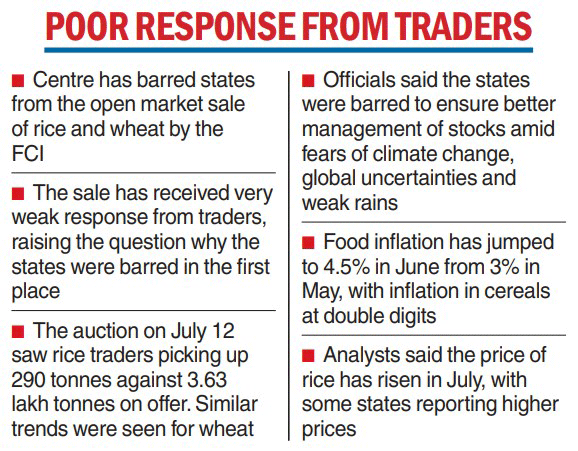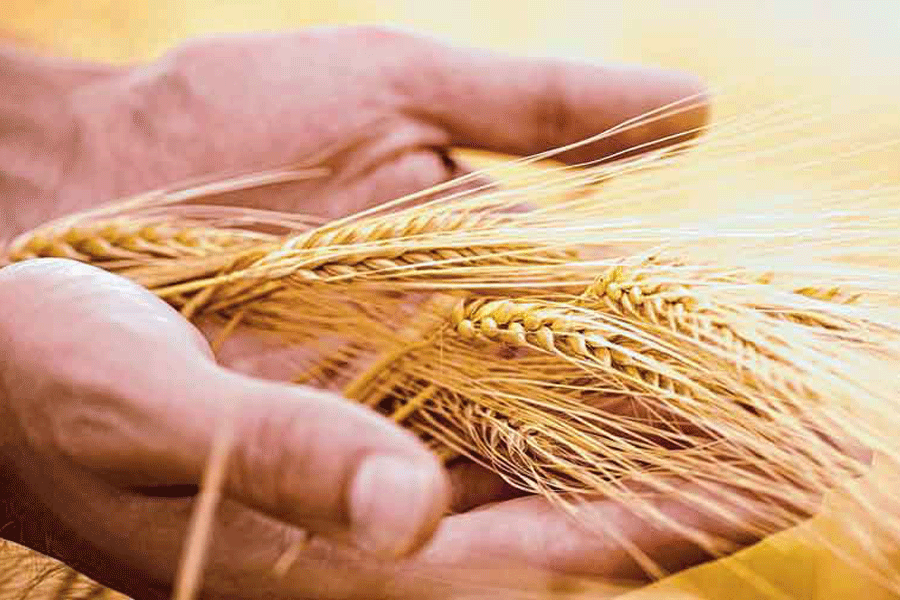The decision to shut out state governments from the sale of wheat by the Food Corporation of India has come unstuck, with the e-auction receiving a lukewarm response traders.
Traders have picked up just 290 tonnes of rice in the auction — the open market sale scheme or OMSS — on July 12 against 3.63 lakh tonnes on offer.
In the auction of July 5, they picked up 170 tonnes against 3.88 lakh tonnes on offer.
In wheat, the FCI offered 4.18 lakh tonnes on July 12, but the traders bought about 1.75 lakh tonnes or 42 per cent.
The FCI could sell just 1.29 lakh tonnes of wheat on July 5 against 4.07 lakh tonnes it offered to the traders.
In a bid to control the retail prices of foodgrains, the Modi government has decided to sell wheat and rice from the central pool to retailers, processors and traders in the open market under OMSS.
States were barred from the e-auction so that more traders can participate in the sale.
Several state government locked horns with the Centre over the move, with the Opposition Congress charging the Centre with playing politics with the poor after having lost the Karnataka assembly polls.
The Karnataka government alleged the Centre took this decision to stall its subsidised Anna Bhagya Yojana scheme. The state government claims the FCI was ready to supply rice at Rs 34per kg.
The Jharkhand government has also criticised the Centre’s decision as the non-availability of rice from the central pool forced the state to buy rice at a higher price for its welfare schemes.
Food ministry officials said the move was taken in the larger interest of the people.
They argued that sufficient stocks needed to be maintained for timely market intervention amid concerns over monsoon, climate change and the geo-political situation.
The move to discontinue grains under OMSS to the state governments was taken keeping in mind these uncertainties.
The Centre is also considering banning most varieties of rice, with a surge in food inflation.
The Centre had previously banned all non-basmati rice exports between 2008 and2011.
Consumer price inflation (CPI) rose to 4.8 per cent in June, after falling to a 20-month low of 4.3 per cent in May. Food inflation jumped to 4.5 per cent from 3 per cent, driven by cereals, milk, spices, pulses, edible oils and vegetables.
Inflation in cereals was stable, but high at 12.7 per cent in June.
Among cereals, rice inflation was higher at 11.8 per cent from 11.5 per cent, while it eased marginally in wheat to 12.4 per cent from 12.6 per cent.
The government continues to ban the export of wheat.
“As the world’s biggest exporter of rice, India accounts for about 40 per cent of global exports. An export ban would have severe repercussions for global rice prices, and India would risk the ire of the international community. But a ban would probably help to cool domestic prices at apolitically expedient time as the campaigning for the general election in 2024 will start over the next couple of months,” Shilan Shah, deputy chief emerging markets Economist, CapitalEconomics, said.
He said daily retail data showed the price of rice has edged up in July and some states have experienced more significant increases in prices.
Madan Sabnavis, chief economist, Bank of Baroda, said: “While overall monsoon is above normal, 15 meteorological divisions have registered deficient progress. Rice, maize and pulses continue to be areas of concern in terms of area under cultivation. El Nino is likely to affect the country somewhere in the middle of monsoon and hence the next 30 days or so will be critical.”











